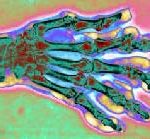ACR CONVERGENCE 2020—Rheumatologists and patients have struggled with a lack of new therapies for systemic lupus erythematosus (SLE), but a better understanding of the underlying mechanisms behind the disease helps shed light on potential treatments. That was the theme of the ACR Convergence session State of the Art: Lupus—The Future Is Now, led by Peggy…







